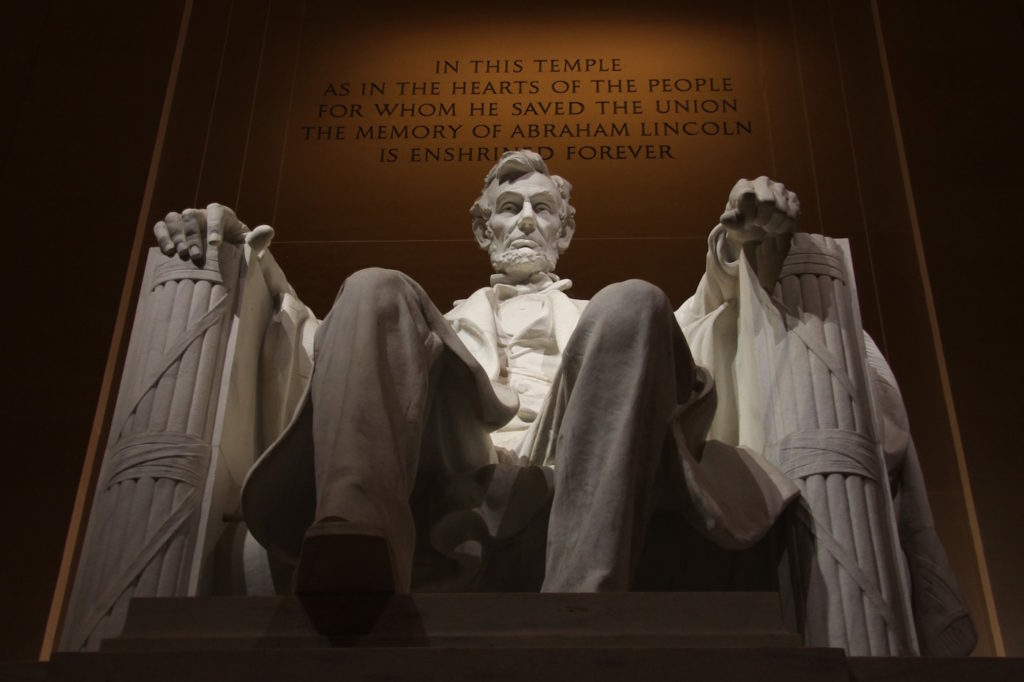This essay is part of our series on the significance of the rise of the “Nones.” See the full collection here.
In 1846, while running for the only term he would serve in the US House of Representatives, Abraham Lincoln had to respond to the talk going around his Illinois district that he was “an open scoffer at Christianity.” In a country still very saturated with the reinvigorated faith of the Second Great Awakening, this was the sort of reputation that could end a political career.
Lincoln’s response was interesting for its combination of candor and canniness. In a handbill distributed in the community (the text of which also appeared in a local newspaper), he wrote: “That I am not a member of any Christian Church, is true; but I have never denied the truth of the Scriptures; and I have never spoken with intentional disrespect of religion in general, or of any denomination of Christians in particular.” He went on to say that as a younger man (he was still only thirty-seven), he had for a time entertained the “Doctrine of Necessity,” disbelieving in free will—but added that he had “always understood this same opinion to be held by several of the Christian denominations.” Then he concluded:
I do not think I could myself, be brought to support a man for office, whom I knew to be an open enemy of, and scoffer at, religion. Leaving the higher matter of eternal consequences, between him and his Maker, I still do not think any man has the right thus to insult the feelings, and injure the morals, of the community in which he may live. If, then, I was guilty of such conduct, I should blame no man who should condemn me for it; but I do blame those, whoever they may be, who falsely put such a charge in circulation against me.
Start your day with Public Discourse
Sign up and get our daily essays sent straight to your inbox.
Notice that Lincoln appealed both to the moral sense of the community—which he seemed to believe rested on religion—and to the toleration of his neighbors whose votes he desired. After all, he admitted that he was “not a member of any Christian Church.”
He was what we would today call a “None.”
An “Unchurched” Man
Indeed, two of Lincoln’s earliest notable speeches—the Lyceum Address of 1838 and the Temperance Address of 1842—speak glowingly of “unimpassioned reason” as the best ground of the nation’s “political religion,” and of the “reign of Reason” as leading to the country’s “moral reformation.” Why, this fellow Lincoln, were he alive today, might pronounce himself one of the “brights” who can do without conventional religious faith of any kind, who can live without the myths others seem to need.
To be fair, these early speeches and statements of Lincoln’s bear closer study; their arguments are not so simple as I’ve made them appear. And we know that in the crisis of the Civil War, as the carnage cost lives almost beyond counting, Lincoln turned more and more to the view that God’s providential hand was at work in American affairs. The explicitly Christian thrust of his great Second Inaugural Address is impossible to miss.
But dwell for another moment on that final paragraph of Lincoln’s 1846 handbill. It’s one thing, Lincoln says, to be an unchurched man; that he is, and he admits he is. It’s another thing to be “an open enemy of, and scoffer at, religion.” For to be such a man is to “insult the feelings, and injure the morals, of the community.” For all the differences there might be among Christian denominations—differences that remind us that the freedom to differ in belief, and even to disbelieve, is essential—there is, Lincoln seems to be saying, an intimate relation of the people’s religious beliefs to their morals and their feelings. The man who mocks or disregards the first harms the second and wounds the third. He is not to be honored by being made the people’s representative.
This is not about imposing a formal “religious test” for serving in office, of the kind that Article VI of the Constitution forbids; Lincoln is not advocating that. It’s not even about what the candidate himself—such as Lincoln—actually believes. It’s about the trust that must obtain between officeholder and constituents. Lincoln here affirms that the American people are a religious people, that their religion does great good, and that they should be represented by leaders who recognize and honor their faith and the sensibilities that arise from it.
The Loss of Religious Institutions
But Abraham Lincoln was unusual in his own time. What happens if, as is the case today, the “nones” are much greater in number? As Nathaniel Peters has noted here at Public Discourse, the University of Chicago’s General Social Survey puts the (non)affiliation “no religion” at 23 percent. To be sure, a high proportion of Americans still pray, view the Bible as sacred scripture, and attend religious services—though frequency of church attendance is falling rapidly.
What seems to be happening is that our nones today are not frankly atheist, or even more cautiously agnostic. What they are is unchurched, like Abraham Lincoln. Peters suggests in his essay that many of these nominally religious (for the most part nominally Christian) Americans are actually adherents of what Christian Smith and Melinda Denton call “moralistic therapeutic deism.” Perhaps so. What they might even more probably be are people who have conceived a deep skepticism, even a hostility, toward “organized religion,” the institutional churches to which they or their forebears once belonged. Given the scandalous moral and leadership failures of many of our churches, it is hard to blame them for such disaffection.
But the effective “de-institutionalization” of so many Americans’ spiritual lives unavoidably entails some serious fallout in various ways. For one thing, an authentic involvement in any religion requires a communal experience, which ordinarily entails some institutional structure as well. This does not necessarily require a class of clerical leaders, of course. The “unprogrammed” Quakers of the Philadelphia tradition have no ordained clergy, only rotating lay leaders of each Friends Meeting, yet they have a recognizable institutional structure and a real community of worship, with traditions and doctrines that they maintain as a body.
Resolving to be “spiritual but not religious,” or sliding into being “Christian” but unchurched, staying home on Sundays or randomly dropping into this church or that, means forgoing all of this. The brotherhood, the shared devotion, the joint responsibility for everything from the church’s physical maintenance to the preservation of its teachings and their transmission to the next generation—all these one jettisons if one opts for solitary Bible reading, prayer, and contemplation. Even those solitary pursuits are apt to fall by the wayside of one’s life, since all that supports them is individual determination. Then all one has left, like some vestigial bone with no function, is the box one checks “Christian” or “Catholic” or “evangelical” on a survey.
Political Fallout
This in turn may have a political effect. As people drift away from organized religion—which is itself one of the most powerful organizers of collective human effort in civil society—they may be inclined to rest too much of their hope for society’s betterment in politics instead.
As civic organizations based on face-to-face interactions, our political parties are pretty much dead. But they survive rather like the faux “communities” of sports fanatics who wear “their” teams’ jerseys and caps. Being a partisan Democrat or Republican can easily become just a way of saying “our side” and “their side,” in many ways as empty and atomized as being Yankees or Red Sox fans, except the stakes in the governance of the nation are very real. And just as the fan attaches himself emotionally to the star players on his team, the partisan attaches himself to his party’s leaders, sometimes beyond rational cause.
But while it is permissible, even part of the harmless fun of the game, for the Yankees fan to loathe and despise the Red Sox and their fans, and vice versa—but, I hasten to add, only in the abstract case of the distant “type” of the rival, not in the actual case of the person one knows—it is far from harmless for Democrats and Republicans to indulge in hatred of one another. Again, this is because the stakes are so real, with elections and policy decisions that can profoundly affect people’s material conditions, their moral standing in the community, even their freedom itself.
Is the increasing political polarization we see today in some measure a consequence of the rise of the nones? It certainly could be.
America’s political parties have always cultivated their animosities toward one another, and spikes of real intensity (even violent ones) have occurred in the past, ever since our first parties formed in the 1790s. But America’s religious communities, at their best, have always been capable of cutting across our partisanship at its worst. This has been true in the pews of each church, and often even in ecumenical and interfaith fellow-feeling. It will not do to project onto the past a false image either of milder partisanship or of brotherly religious sentiment. But it does feel at times as though our “us vs. them” politics functions as an effective substitute for religious observance, membership, and devotion. If there were more of the latter—more authentic religious practice—there might be less of the former.
Secularists vs. Theocrats?
It is often observed that today’s Democratic Party is the central locus of secular America, whereas the Republican Party is where one increasingly finds those citizens who are most observant and orthodox in their religious traditions. The nones are undeniably a force in both parties, for it is also the case that support for President Trump in 2016 and to this day has been strongest among those Republicans who are notionally but not actively Christian. Yet there is much truth to the generalization “secular progressive Democrats vs. religious conservative Republicans.” We can certainly say that the most aggressive actors in the culture wars, answering these descriptions, are essential components of the two-party coalitions.
And so we might conclude that one consequence of attenuated religious practice and declining belief is that many of the nones gravitate to one party and the observant religious to the other, giving rise to lurid portraits of both sides by one another—“radical secularists” and “theocrats” in a Kulturkampf to the death. This only accelerates the centrifugal pull of our polarized politics, driving us further away from one another as citizens and neighbors.
The force of that centrifuge even affects relationships within the opposing groups—among the liberals, the Democrats, the nones, and among the conservatives, the Republicans, the religious. So a respected liberal law professor at Harvard loses his residence-house deanship because “woke” students are outraged at his joining the defense team of Harvey Weinstein. And transgender activists are intent on taking down “TERFs” whose feminist credentials were impeccable the day before yesterday. Meanwhile, on the right, divisions over President Trump, as well as over how to respond to “them” on the left, feed into internecine strife even among erstwhile allies in the conservative punditocracy.
It’s hard not to conclude that with rising “none-ism,” too many Americans have too much invested in politics as the center of their belief systems. Now it seems that an overinvestment in politics is even affecting Americans furthest of all from being “nones.” We might conclude that when the morals of the community are up for grabs, the feelings of the community are bound to be on edge and hyper-sensitized.
It turns out that America can tolerate a modest number of unchurched folks, but not too many. We can have, it seems, too many Abraham Lincolns in our midst.















